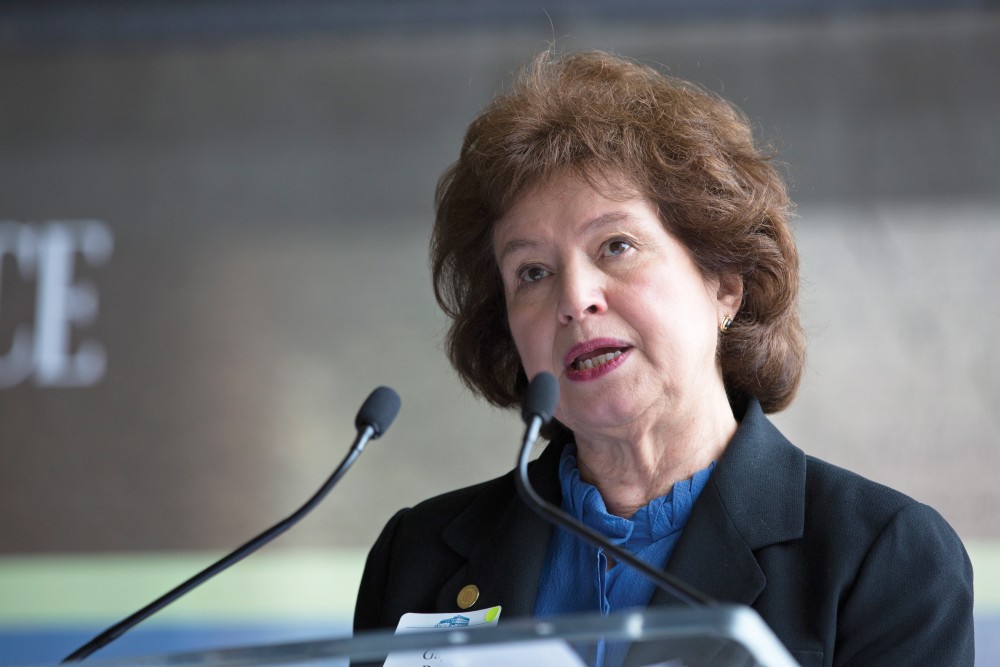Taking attendance

GVL / Kevin Sielaff Provost Gayle Davis speaks in front of the new science building. Grand Valley celebrates the P. Douglas Kindschi Hall of Science with a dedication ceremony Friday, August 28th, 2015. The dedication recognized both Grand Valley and state officials that made the realization of this building possible.
Feb 8, 2016
Students at Grand Valley State University are often warned of the repercussions for missing class. From partial credit taken away to a deduction in grade, students are told that their attendance is to be taken very seriously. But when it comes to canceling or even cutting short a class, are professors required to follow a similar set of rules?
According to a survey conducted by the Lanthorn on 100 random students, exactly half said they have taken a class scheduled to go at least 2 hours and 50 minutes in which the professor regularly cut it short by 30 minutes or more.
The survey also revealed that 55 percent of respondents believe classes at GVSU scheduled to go the same amount of time typically do not run the full period.
Gretchen Galbraith, associate dean of faculty at GVSU, said professors are allowed to end these longer class periods early only under rare circumstances or if the scheduled 10-minute break times are not taken.
“Remember that a 3-hour class is actually 150 minutes of instruction time,” Galbraith said. “Depending on how instructors and their class decide how to use the 10 minutes of break per hour of class, such a class might finish ‘early’ but still meet for the 150 minutes of instruction.”
Galbraith said she hasn’t heard many complaints from students concerning professors ending class early.
“It’s pretty unusual for students to complain about getting extra time back, but I would expect to hear complaints if students were routinely meeting for less than the scheduled time,” she said. “Even when all the material for a class has been covered, there are still plenty of meaningful opportunities for learning when an instructor and students have a little extra time at the end of a class session.”
50 percent of those surveyed by the Lanthorn also said they have had a professor cancel class for reasons other than the weather or medical issues. The survey did not include personal emergencies or a family crisis as a reason to cancel class.
Respondents were asked to name reasons given by professors for canceling class, the majority of which were for out-of-town business, seminars or conferences.
Other reasons provided in the survey include: “Vacation,” “flight delay,” “sick child,” “family death,” “traveling,” “personal reasons,” “wedding,” “had to watch kids,” “job interview,” “shopping sale,” and “forgot we had class.”
In the GVSU 2015-16 faculty handbook, it states that faculty members are responsible for meeting all classes for which they are scheduled. If a faculty member is absent, they are required to notify the appropriate department head and make plans to cover missing teaching assignments.
The handbook does not provide a specific number of absences allowed for each faculty member.
Gayle Davis, provost and executive vice president for academic and student affairs, said adequate excuses for a professor canceling class include personal sickness or injury, professional obligations such as attending a conference, as well as a family illness, among others.
“There is no set reasonable number (of absences) if the reason and planning are adequate since different people are called upon for different reasons and illness and family crises happen unexpectedly,” Davis said. “If absences are predictable (need to travel for professional purposes, conflicting crucial obligation), the faculty member gives notice to the department chair.”
Davis said professors are not checked up on throughout the semester to see if they are attending class. Instead, a department chair will only investigate a professor’s behavior if there is reason to believe there’s a problem.
If a professor is found to have regularly skipped or cut class early, Davis said repercussions are decided according to the individual situation.
“(The department chair) would have a discussion to explore what is going on, and depending on the conversation, appropriate change in behavior might be required,” Davis said. “These are entirely individual cases. If the problem persists, more serious repercussions are felt.
“Always letting a class out early or starting late is not acceptable.”
While professors are not scrutinized without probable suspicion, Davis said they are one of the most evaluated employee groups on campus.
“Faculty are professionals, and as such they are trusted to make good professional decisions,” she said. “If they don’t behave professionally, they are subject to semester by semester evaluations by students and others. The evaluations effect their salaries and their progress to tenure and promotions.”

























